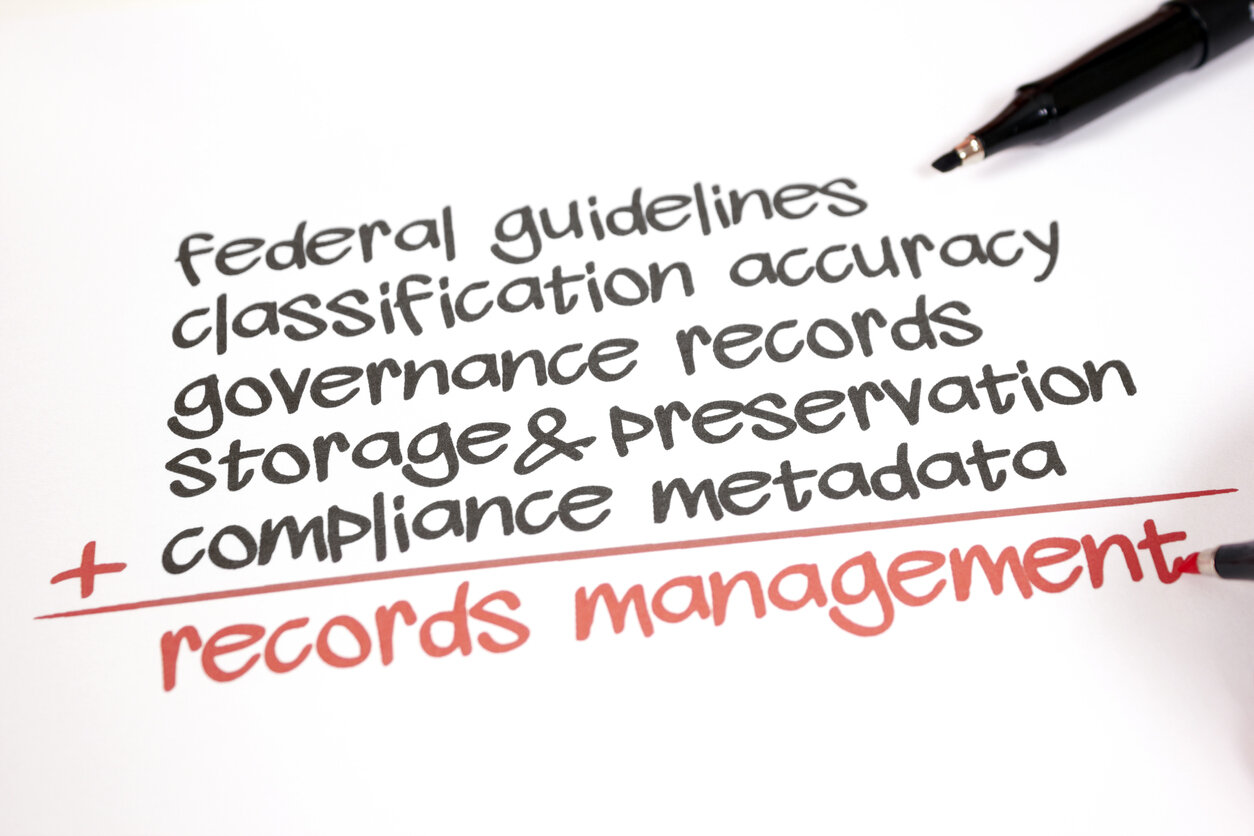A proper record-keeping system is the key to staying on top of all the filings, fees, and regulations required of small businesses
Small businesses answer to several regulatory agencies and are responsible for making periodic filings and payments to federal, state, and local governments. Failure to do so can result in fines, legal action, and even a business’s dissolution.
With so many requirements to track, a small business owner’s best ally is a comprehensive, easy to use record-keeping system. In this case, “system” does not refer to just software. It is a combination of processes and tools managed by accountable employees.
It’s easy to get overwhelmed by the huge amount of print and electronic forms of data any small business generates daily. When talking about maintaining company records, you’ll hear the terms document management, record-keeping, and records management used interchangeably. It seems like these all address the same function, but there are notable differences among the three.
Document management refers to how your business handles any printed or digital data, typically but not limited to work products. “Document” is a broad term that does not imply any official designation or purpose. If you use a file folder structure on Google Drive to manage your company’s work, you are using a document management system.
Record-keeping is the process of maintaining evidence of your business operations. “Record” in this application refers to official print or digital data that capture a business function, ranging from leases to timecards to receipts. Records play an important role in compliance and rules apply to their use, retention, and storage.
Records management is used to describe the company-wide solution for maintaining the official records required to stay in compliance. For larger companies, records management systems can include a network of software programs and a process for warehousing hard copy records off-site. Smaller entities can manage with lower-tech combinations of an accounting system and hard copies organized in a filing cabinet or similar storage system.
Not every business needs an elaborate system for managing records. You do need something that works for your unique business needs, is easy to maintain, is organized, is easily accessible, and ties into a calendar system that alerts you of upcoming due dates.
Here are some tips for better record-keeping and implementing a records management system for your small business that will keep you in compliance.
First, be aware of record-keeping rules
There are some general requirements all businesses must meet to maintain internal and external compliance, but many depend on your business’s industry, function, and location. Employment laws also demand proof of compliance. The Small Business Association and the IRS are excellent sources for information about federal mandates. At the same time, states and local chambers of commerce can help with local regulations.
In addition to rules governing filings, there are many federal and state regulations concerning how long you must keep company records. The short answer, according to the IRS, is seven years.
Next, assess your current processes and tools
Consider your team’s workflows. If you are dissatisfied with your existing processes, adopting new technology could help. Ask yourself:
-
Do you run into problems finding the data to answer common business questions?
-
Was last tax time a nightmare to prepare for, or were you able to easily gather all the information you needed?
-
Are you meeting the due dates for all your necessary filings by using a simple calendar or tickler process, or is it time to get a bit more sophisticated?
If you are struggling to access necessary information or make deadlines, a system upgrade is in order.
Start with your low-tech functions: Do you need a better hard copy filing system or a central repository for all “essential” documents? Should you appoint a company records czar? Should some of your records be located off-site?
If your shortcomings are related to the technology you’re using, do some research. Many financial management software programs go beyond accounting and address record-keeping for financial health monitoring and compliance.
Get the whole team on board
Successful record-keeping for compliance and to monitor your business’s financial health should be a team effort. If, after reviewing your current processes, you identify some weak links, try reengineering your workflow. Develop written policies for managing all your company’s documents, some of which will be vital records. Assign someone the compliance calendar to monitor – and assign a backup.
If you are changing existing workflows and responsibilities, plan employee training opportunities to inform everyone of the new process and standards.
Lock it all down
It is essential to safeguard your company’s records, both hard copies and digital files. Make sure that any system you implement has adequate security measures built-in. Also, develop a disaster recovery plan that makes vital documents readily accessible in case of an emergency, and protects vulnerable hard copies.
Enlist expert help
Small business record-keeping is essential for the success of your company. Sometimes it makes sense to bring in outside help rather than handling it alone. Outsourcing some or all of your accounting responsibilities may be something to consider.
At Franco Blueprint, we help business owners make the best decisions about managing their accounting needs, including record-keeping.
It is our business to assist small business owners and help them secure their livelihoods during times of crisis and beyond. Contact us for a free consultation today.


